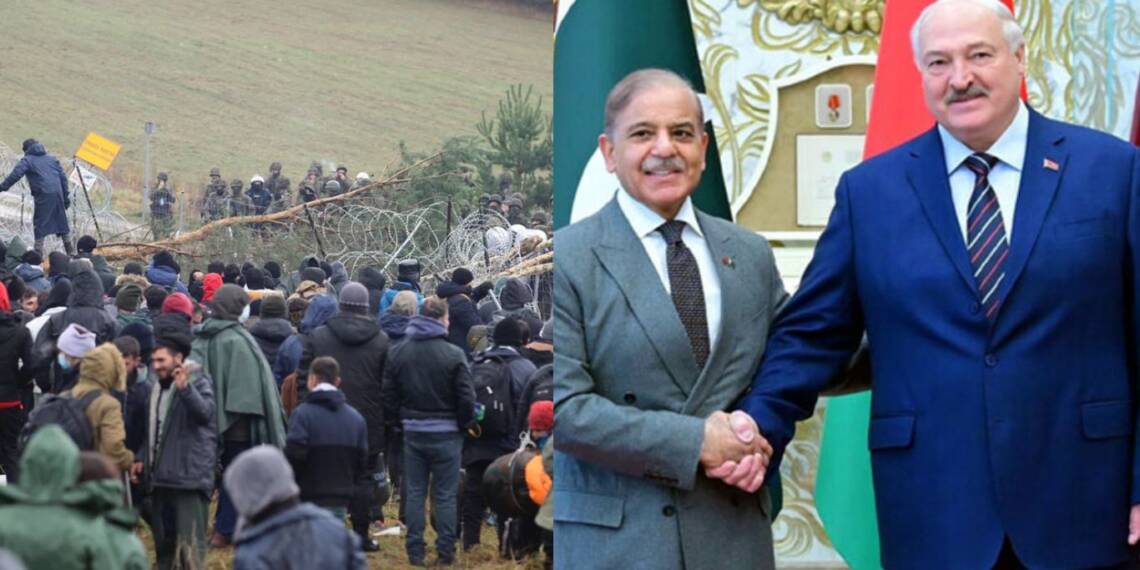Belarus is planning to bring in up to 150,000 migrant workers from Pakistan. The country’s President, Alexander Lukashenko, shared this news after a meeting with Pakistan’s Prime Minister, Shehbaz Sharif, in Minsk on Friday.
Lukashenko said both leaders had agreed to send Pakistani workers to Belarus soon. The two countries will decide the type of jobs. Pakistan will help select the right people for the work.
He said, “Let there be 100,000, or 120,000, or even 150,000 Pakistani specialists. We are ready to accept them. Belarus will create all the conditions needed for them to work here.”
The Pakistani prime minister promised that the workers sent will be trained and able to help Belarus. He said they are hardworking, skilled, and also responsible family people. He added that these workers will also help build strong relations between Belarus and Pakistan. However, sending 150000 skilled people is not easy.
Sharif thanked Lukashenko for inviting Pakistani workers. Calling him a “brother,” he said the offer made his day.
However, there is a big problem with these so-called skilled labourers. Europe is already struggling with immigration from West Asia and North Africa. The social fabric of Europe is being destroyed due to the differences in values between European society and the immigrants. The records of Pakistanis abroad are very shameful and scary. Let’s talk about some of the incidents here.
Pakistani Grooming Gang Scandals in the UK
We all must remember the recent political turmoil in the UK. Over the past decade, several high-profile sexual exploitation cases in the UK involved groups of mostly Pakistani-origin men, often referred to as “grooming gangs.”
These cases first became widely known around 2012 with the Rochdale grooming gang case, where a group of men — most of them of Pakistani heritage — were convicted for grooming, abusing, and trafficking underage white British girls, some as young as 13.
Other towns like Rotherham, Telford, Oxford, Huddersfield, and Newcastle also saw similar scandals. Official investigations, especially the Rotherham Report (2014), found that around 1,400 girls were abused over 16 years (1997–2013) in just that one town.
Many critics pointed out that police, social workers, and even politicians were often reluctant to act for fear of being labelled “racist” or “Islamophobic.” This allowed the abuse to continue for years. Remember, these Pakistani-origin people have been living in the UK for generations but have not integrated themselves yet with the local populations. Then how can a first-generation worker not create social problems in Belarus?
Pakistanis Banned by Saudi Arabia
Even the custodian of the two holy mosques and leader of the Muslim world, Saudi Arabia, understands the basic problems with the Pakistanis.
In early 2024, Saudi authorities cracked down on illegal begging in the Kingdom. It was reported that a significant number of those arrested for organized begging were Pakistani nationals.
The problem had become so severe that Saudi Arabia reportedly stopped issuing certain types of visas for Pakistanis, especially for individuals suspected of coming to the country under false pretences and ending up as part of begging rackets.
Saudi officials said most of the arrested beggars were part of “organized gangs” and not individual cases of poverty. These gangs would use people — including children and disabled individuals — to earn money through begging, particularly in Mecca and Medina during the Hajj and Umrah seasons.
This led to a temporary restriction on Pakistani visa approvals until Pakistan’s government promised better monitoring and pre-screening of travellers.
Issues Linked to Immigration in Europe
While many immigrants settle peacefully and contribute to society, some European countries have faced social and security challenges connected to migrant communities, especially those with a majority-Muslim background. The cases sparked debates in Europe about immigration, integration, multiculturalism, and the dangers of political correctness.
Examples include:
Crime & Parallel Societies: In cities like Stockholm, Malmö, Paris, Berlin, and Brussels, some migrant-heavy neighbourhoods (often called “no-go zones” in media) have seen rising crime, drug trafficking, and gang activity.
Terrorism: Europe faced major terror attacks between 2015–2017, such as the Paris Bataclan attacks (2015) and Brussels bombings (2016). Several attackers were second-generation immigrants or refugees with links to ISIS or Al-Qaeda.
Social Integration Issues: In countries like France, Germany, and Sweden, concerns grew about communities not integrating, practising cultural customs in conflict with local laws (forced marriages, honour killings, polygamy, etc.), and religious extremism in schools and mosques.
Hence, the current most challenging problem that Europe is facing is immigration, and Belarus seems to be inviting the same problem for itself.








